
A few weeks ago, we introduced Amanda Bosiak, a local soap maker and owner of the brand Pithy and Practical. She creates hot process soaps using a slow cooker, and this week she wants to share some tips if you want to try your hand at soap making!
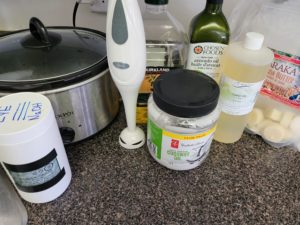
To make your own soap, you’ll first need to find a recipe to follow which Amanda says you can find on Pinterest! You’ll also need to find a lye calculator which will tell you exactly how much lye you need to use based on the amount of oils you have. The lye amount will also vary based on the type of oils you are using. You’ll also need to make sure that you are calculating for hot press soap and not cold press soap. We’ve saved you some time with a recipe you can follow below!
The recipe should include 40% water and 5% super fat. There needs to be quite a bit more water content when taking hot process soaps because as it heats up the water evaporates. So, you’ll need to add more water because you’ll want to keep it as pliable as possible. Superfatting the soap allows it to be softer in the end! Here is the recipe that Amanda works with:
| 135g | Avocado oil |
| 45g | Castor oil |
| 135 | Cocoa butter |
| 225g | Coconut oil |
| 90g | Olive oil |
| 225g | Shea butter |
| 360g | Water |
| 123 g | Sodium Hydroxide (NaOH) |
| 37g | Fragrance (*optional) |
| 45g | Superfat 5% – Shea Butter |
| (note: solid oils make the best superfats) |
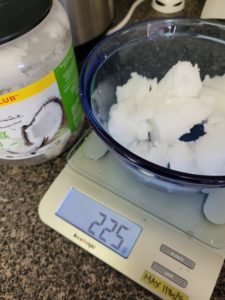
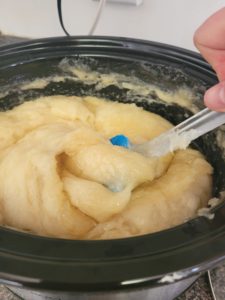
Step 1: Add liquid oils and then add solid oils after microwaving
Step 2: Add lye solution with sodium lactate or plain Greek yogurt
Step 3: Cook in crockpot at low heat, covering half with plastic wrap
Step 4: Use the immersion blender, carefully mixing on low power for 10 second increments until it thickens
Step 5: Fully cover with both the plastic wrap and lid. Let cook for 45 minutes to 1.5 hours, checking on it every 10 minutes or so
Step 6: Check the pH level by taking a tsp of the soap and adding it to quarter cup of distilled water. Test with the pH strip and it should read 10pH.
Step 7: Once the mixture is ready, leave it to sit with the slow cooker turned off. During this time, melt down the super fat and add any essential oils and colourants you want for the final product. Once it’s finished, add the mixture to the soap in the slow cooker. Stir until it’s evenly distributed.
Step 8: Add mixture to loaf and decorate the top however you want. As the mixture cools, it begins the saponification process to turn into soap. It takes between 24-48 hours until you can unmold, cut, and cure.

Pithy and Practical is a handmade, hot process soap brand created by talented local, Amanda Bosiak. Amanda has always been crafty, learning skills such as cross stitching, drawing, painting, knitting, and sewing! She has spent her life delving into creative projects and taking part in creative organizations. To Amanda, being a Maker is kind of a lifestyle, stating that she is happiest when she is making things. She believes that being a Maker gives freedom to be creative and self-sufficient.
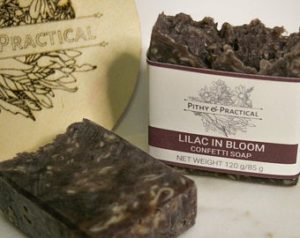
Amanda’s inspiration for Pithy and Practical came from creating a solution for her own skin concerns, trying to step away from harsh and drying ingredients. Most products found in stores are known to have many harsh and drying ingredients, such as alcohols, parabens, and other chemical additives. Using products with toxic fillers too frequently and over a long period of time can cause skin irritation, acne, and other skin problems. With this in mind, Amanda decided to create her own product, knowing exactly what ingredients are going into the soaps.
“I wanted a soap that I could really lather up and would leave me feeling squeaky clean but not dry. If it also had some extra ingredients with known benefits for skin, even better!”
Amanda’s philosophy is rooted to creating a multi-beneficial product that is not harmful for the skin. She went through trials, testing many different ingredients until she came up with the perfect combination. Her products are gently cleansing with a rich and creamy lather. With the oils and butters used, the soaps have deep moisturizing properties.
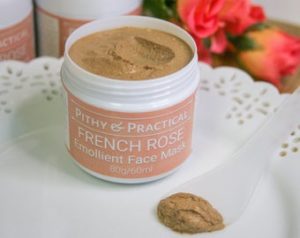
Amanda makes her hot process soap in a slow cooker at home, using a mixture of lye, water, oils, and butters. Using this technique allows for a quicker saponification process, which is a reaction that causes the conversion of the fats and oils to create soap! Amanda believes that handmade soaps are the way to go for cleansing rather than purchasing mass produced cleansers. It is a whole different experience when you purchase something local, made by someone passionate about what they are creating.
Other than the cleansing and moisturizing components, Amanda likes to play around with a variety of scents! Some of the unique scents include green tea and peppermint, tomato citrus, lilac, and apple mango. The collection in Pithy and Practical are not only soaps, but there are also lotions, balms, and face masks available!
If you would like to read more or shop online, head over to the Pithy and Practical website here!